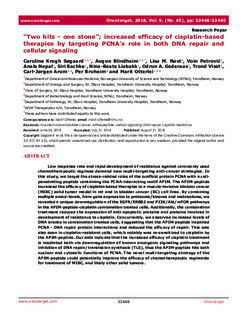| dc.contributor.author | Søgaard, Caroline Krogh | |
| dc.contributor.author | Blindheim, Augun | |
| dc.contributor.author | Røst, Lisa Marie | |
| dc.contributor.author | Petrovic, Voin | |
| dc.contributor.author | Nepal, Anala | |
| dc.contributor.author | Bachke, Siri | |
| dc.contributor.author | Liabakk, Nina-Beate | |
| dc.contributor.author | Gederaas, Odrun Arna | |
| dc.contributor.author | Viset, Trond | |
| dc.contributor.author | Arum, Carl-Jørgen | |
| dc.contributor.author | Bruheim, Per | |
| dc.contributor.author | Otterlei, Marit | |
| dc.date.accessioned | 2019-02-21T07:49:58Z | |
| dc.date.available | 2019-02-21T07:49:58Z | |
| dc.date.created | 2018-09-06T10:22:48Z | |
| dc.date.issued | 2018 | |
| dc.identifier.citation | OncoTarget. 2018, 9 (65), 32448-32465. | nb_NO |
| dc.identifier.issn | 1949-2553 | |
| dc.identifier.uri | http://hdl.handle.net/11250/2586614 | |
| dc.description.abstract | Low response rate and rapid development of resistance against commonly used chemotherapeutic regimes demand new multi-targeting anti-cancer strategies. In this study, we target the stress-related roles of the scaffold protein PCNA with a cell-penetrating peptide containing the PCNA-interacting motif APIM. The APIM-peptide increased the efficacy of cisplatin-based therapies in a muscle-invasive bladder cancer (MIBC) solid tumor model in rat and in bladder cancer (BC) cell lines. By combining multiple omics-levels, from gene expression to proteome/kinome and metabolome, we revealed a unique downregulation of the EGFR/ERBB2 and PI3K/Akt/mTOR pathways in the APIM-peptide-cisplatin combination treated cells. Additionally, the combination treatment reduced the expression of anti-apoptotic proteins and proteins involved in development of resistance to cisplatin. Concurrently, we observed increased levels of DNA breaks in combination treated cells, suggesting that the APIM-peptide impaired PCNA - DNA repair protein interactions and reduced the efficacy of repair. This was also seen in cisplatin-resistant cells, which notably was re-sensitized to cisplatin by the APIM-peptide. Our data indicate that the increased efficacy of cisplatin treatment is mediated both via downregulation of known oncogenic signaling pathways and inhibition of DNA repair/translesion synthesis (TLS), thus the APIM-peptide hits both nuclear and cytosolic functions of PCNA. The novel multi-targeting strategy of the APIM-peptide could potentially improve the efficacy of chemotherapeutic regiments for treatment of MIBC, and likely other solid tumors. | nb_NO |
| dc.language.iso | eng | nb_NO |
| dc.publisher | Impact Journals | nb_NO |
| dc.rights | Navngivelse 4.0 Internasjonal | * |
| dc.rights.uri | http://creativecommons.org/licenses/by/4.0/deed.no | * |
| dc.title | "Two hits - one stone" increased efficacy of cisplatin-based therapies by targeting PCNA's role in both DNA repair and cellular signaling | nb_NO |
| dc.title.alternative | "Two hits - one stone" increased efficacy of cisplatin-based therapies by targeting PCNA's role in both DNA repair and cellular signaling | nb_NO |
| dc.type | Journal article | nb_NO |
| dc.type | Peer reviewed | nb_NO |
| dc.description.version | publishedVersion | nb_NO |
| dc.source.pagenumber | 32448-32465 | nb_NO |
| dc.source.volume | 9 | nb_NO |
| dc.source.journal | OncoTarget | nb_NO |
| dc.source.issue | 65 | nb_NO |
| dc.identifier.doi | 10.18632/oncotarget.25963 | |
| dc.identifier.cristin | 1607158 | |
| dc.description.localcode | Copyright: Søgaard et al. This is an open-access article distributed under the terms of the Creative Commons Attribution License 3.0 (CC BY 3.0), which permits unrestricted use, distribution, and reproduction in any medium, provided the original author and source are credited. | nb_NO |
| cristin.unitcode | 194,65,15,0 | |
| cristin.unitcode | 194,66,15,0 | |
| cristin.unitcode | 194,66,25,0 | |
| cristin.unitname | Institutt for klinisk og molekylær medisin | |
| cristin.unitname | Institutt for bioteknologi og matvitenskap | |
| cristin.unitname | Institutt for kjemi | |
| cristin.ispublished | true | |
| cristin.fulltext | postprint | |
| cristin.fulltext | original | |
| cristin.qualitycode | 1 | |

